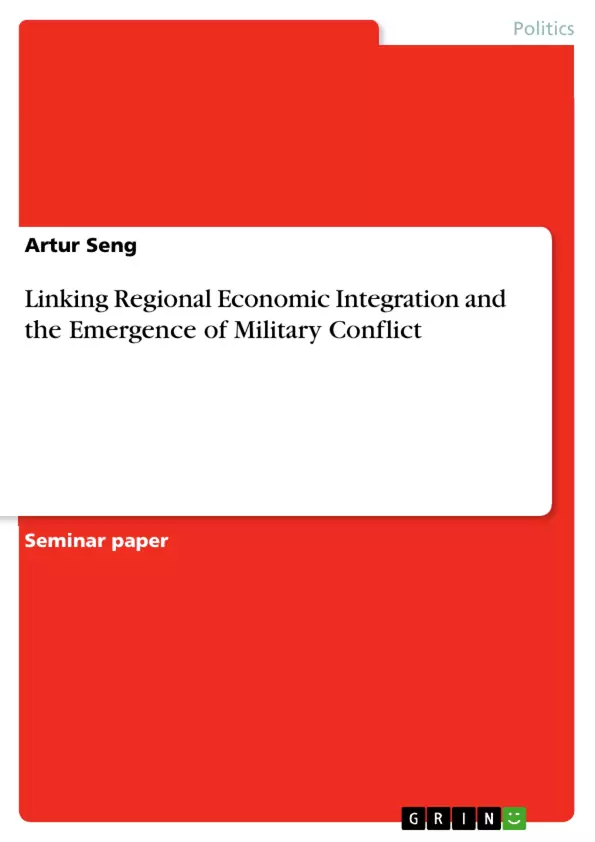When discussing peace and regionalism, often only the peace creating dimension of regional integration is covered. In this paper, a more critical understanding of regional integration will be presented by including possible negative side effects that could influence the emergence of military conflict at the periphery of regional organizations.
To analyse whether this theoretical foundation is sufficient to explain the Ukrainian war, the pa-per will first draw a wider picture of European and Russian regionalism strategies to highlight the competitive dimension of regional economic integration. Afterwards this state of competition will be illustrated in detail by analysing the complex foreign policy and trade situation between the Ukraine, Russia and EU after the end of the Cold War until the beginning of the conflict. At the end, the results of the analysis will be summarized and discussed. Based on that, possible implications for regional eco-nomic integration in general will be deduced. The discussion of possible reasons for the outbreak of the Ukrainian war is of undeniable relevance, as a theoretical understanding might help to prevent similar events.
Inhaltsverzeichnis (Table of Contents)
- Introduction
- Theory
- Regional Economic Integration
- Economic Integration as a source of conflict
- EU vs. Russia - Competing Regionalism
- Economic and political relations of the Ukraine
- Discussion: Reasons the for the conflict
- Conclusion and Implications
Zielsetzung und Themenschwerpunkte (Objectives and Key Themes)
This paper aims to explore the link between regional economic integration and the emergence of military conflict, particularly focusing on the conflict in Ukraine. It moves beyond the traditional liberal perspective on regional integration, incorporating alternative arguments that consider the potential negative side effects of economic integration.
- The competitive nature of regional economic integration
- The role of economic integration in fueling conflict
- The impact of regionalism on political relations and foreign policy
- The case study of Ukraine, EU, and Russia
- Implications for regional economic integration and conflict prevention
Zusammenfassung der Kapitel (Chapter Summaries)
- Introduction: The paper begins by outlining the historical context of the EU's role in promoting peace and stability in Europe. It then highlights the unexpected emergence of military conflict in Ukraine in 2014, tracing its roots to the cancellation of a potential EU association agreement with Ukraine. The introduction sets the stage for the analysis of the link between regional integration and the conflict.
- Theory: This chapter establishes the theoretical foundation of the paper by introducing a multi-faceted approach to regional economic integration, acknowledging the potential negative consequences of economic integration. It defines the concept of regional economic integration and outlines its various stages, focusing on the initial stage of free trade models.
Schlüsselwörter (Keywords)
The main focus of this paper is on the relationship between regional economic integration, particularly in the context of the EU and Russia, and the emergence of military conflict. Key themes include regionalism, economic integration, conflict, foreign policy, and the case of Ukraine. The paper explores the competitive dimension of regional integration and its potential for fueling conflict, analyzing the interplay between economic and political factors.
Frequently Asked Questions
Can regional economic integration cause military conflict?
While often seen as a tool for peace, the paper argues that competitive regionalism can create negative side effects at the periphery, potentially leading to conflict.
What is "competing regionalism" in the context of Ukraine?
It refers to the rivalry between the European Union's integration strategy and Russia's regionalism (Eurasian Economic Union) over influence in countries like Ukraine.
What role did the EU Association Agreement play in the Ukrainian war?
The cancellation of the agreement in late 2013 triggered the Maidan protests and highlighted the deep-seated tensions between EU and Russian economic interests.
How does economic integration affect foreign policy?
Integration often forces countries into specific trade blocs, which can strain political relations with neighbors belonging to opposing or competing regional organizations.
What are the implications for conflict prevention?
The study suggests that a theoretical understanding of integration as a source of competition is necessary to prevent similar escalations at the borders of major regional blocs.
- Quote paper
- Artur Seng (Author), 2019, Linking Regional Economic Integration and the Emergence of Military Conflict, Munich, GRIN Verlag, https://www.grin.com/document/1024200



